Monthly Updates on Recent Books in the History of Christianity
To raise awareness of recent books in the history of Christianity, the editorial staff of Church History: Studies in Christianity and Culture highlights each month a list of 10-15 books in diverse periods and geographical regions that we hope will be of interest to our members. We include here below the fourteenth monthly list, chosen by our staff, with excerpts from the publishers’ blurbs.
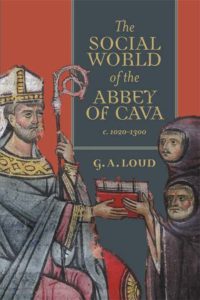
G.A. Loud, The Social World of the Abbey of Cava, c.1020-1300. 2021
The Benedictine abbey of Holy Trinity, Cava, has had a continuous existence since its foundation almost exactly a thousand years ago. From its modest beginnings, it developed during the late eleventh and early twelfth centuries into one of the wealthiest and most influential monasteries in southern Italy.
This path-breaking study, based on many years research into the, largely unpublished, charters of Cava, begins by examining the growth of the abbey's congregation and property, and its struggle subsequently to defend its interests during the troubled thirteenth century. But, in addition, it uses the extensive evidence available to study its benefactors and dependents, administration and economy, and through this material to analyse the social and economic structures of the principality of Salerno. There is also a re-evaluation of the problem of forgery, practised on a large scale at Cava during the thirteenth century, a factor which has complicated and discouraged previous study of this important institution.
A major advance both in the study of the south Italian Church and of the medieval Mezzogiorno during the central Middle Ages, the volume presents a vivid and detailed picture of local society and its workings, and of the families and individuals who had dealings with the abbey.
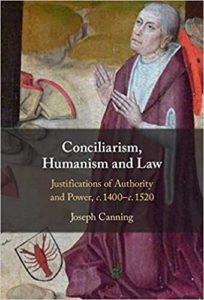
Joseph Canning, Conciliarism, Humanism and Law: Justifications of Authority and Power, c. 1400-c.1520. 2021
How was power justified in late medieval Europe? What justifications did people find convincing, and why? Based around the two key intellectual movements of the fifteenth century, conciliarism in the church and humanism, this study explores the justifications for the distribution of power and authority in fifteenth- and early sixteenth-century Europe. By examining the arguments that convinced people in this period, Joseph Canning demonstrates that it was almost universally assumed that power had to be justified but that there were fundamentally different kinds of justification employed. Against the background of juristic thought, Canning presents a new interpretative approach to the justifications of power through the lenses of conciliarism, humanism and law, throwing fresh light on our understanding of both conciliarists' ideas and the contribution of Italian Renaissance humanists.
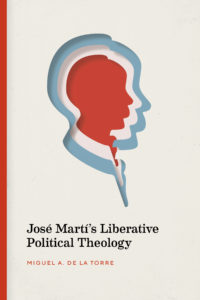
Miguel A. De La Torre, José Martí’s Liberative Political Theology. 2021
José Martí's Liberative Political Theology argues that Martí's religious views, which at first glance might appear outdated and irrelevant, are actually critical to understanding his social vision. During a time in which the predominant philosophical view was materialistic (e.g., Darwin, Marx), Martí sought to reconcile social and political trends with the metaphysical, believing that ignoring the spiritual would create a soulless approach toward achieving a liberative society. As such, Martí used religious concepts and ideas as tools that could bring forth a more just social order. In short, this book argues Martí could be considered a precursor to what would come to be called liberation theology.
Miguel De La Torre has authored the most comprehensive text written thus far concerning Martí's religious views and how they affected his political thought. The few similar texts that exist are written in Spanish, and most of them romanticize Martí's spirituality in an attempt to portray him as a "Christian believer." Only a handful provide an academic investigation of Martí's theological thought based solely on his writings, and those concentrate on just one aspect of Martí's religious influences. José Martí's Liberative Political Theology allows for mutual influence between Martí's political and religious views, rather than assuming one had precedence over the other.
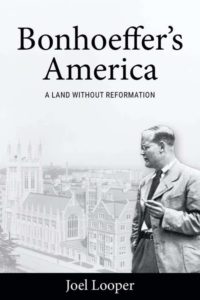
Joel Looper, Bonhoeffer’s America: A Land Without Reformation. 2021
In the 1930s, Dietrich Bonhoeffer came to Union Theological Seminary looking for a "cloud of witnesses." What he found instead disturbed, angered, and perplexed him. "There is no theology here," he wrote to a German colleague. The New York churches, if possible, were even worse: "They preach about virtually everything; only one thing is not addressed... namely, the gospel of Jesus Christ, the cross, sin and forgiveness, death and life." Bonhoeffer acts for American Protestantism as an Alexis de Tocqueville, whose Democracy in America, a cultural and political analysis of the new republic, appeared a century prior. But what the Berlin theologian found was, if possible, more significant than the observations of the French aristocrat: Protestantism in America was a "Protestantism without Reformation."
Bonhoeffer’s America explicates these criticisms, then turns to consider what they tell us about Bonhoeffer’s own theological commitments and whether, in fact, his judgments about America were accurate. Joel Looper first brings Bonhoeffer’s reformational and Barthian commitments into relief against the work of several Union theologians and the broader American theological milieu. He then turns to Bonhoeffer’s own genealogy of American Protestantism to explore why it developed as it did: steeped in dissenting influences, the American church became one that resisted critique by the word of God. American Protestantism is not Protestant, Bonhoeffer shows us, not like the churches that emerged from the Continental Reformation. This difference gave rise to the secularization of the American church.
Bonhoeffer’s claims against the church in the United States, Looper contends, hold strong, even after considering objections to this narrative—Bonhoeffer’s experience with Abyssinian Baptist Church in Harlem, and the possibility that Bonhoeffer, during his time in Tegel Prison, abandoned the theological commitments that undergirded his critique. Bonhoeffer’s America concludes that what Bonhoeffer saw in America, the twenty-first-century American church should strive to see for itself.
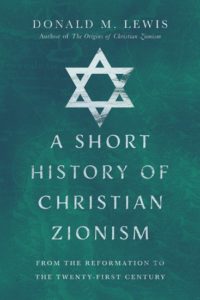
Donald M. Lewis, A Short History of Christian Zionism: From the Reformation to the Twenty-First Century. 2021
This book is about an idea―namely, that Scripture mandates a Jewish return to the historical region of Palestine―which in turn morphed into a political movement, rallied around a popular slogan ("A country without a nation for a nation without a country"), and eventually contributed to the establishment of the state of Israel in 1948. Christian Zionism continues to influence global politics, especially U.S. foreign policy, and has deeply affected Jewish–Christian and Muslim–Christian relations. Donald M. Lewis seeks to provide a fair-minded, longitudinal study of this dynamic yet controversial movement as he traces its lineage from biblical sources through the Reformation to various movements of today. He explores Christian Zionism's interaction with other movements, forces, and discourses, especially in eschatological and political thought, and why it is now flourishing beyond the English-speaking world. Throughout he demonstrates how it has helped British and American Protestants frame and shape their identity. A Short History of Christian Zionism seeks to bring clarity and context to often-heated discussions.
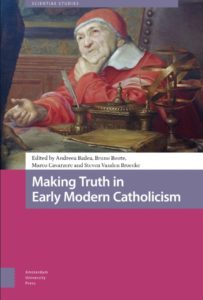
Andreea Badea, Bruno Boute, Marco Cavarzere, and Steven Vanden Broecke, eds. Making Truth in Early Modern Catholicism. 2021
Scholarship has come to value the uncertainties haunting early modern knowledge cultures; indeed, the awareness of the fragility and plurality of knowledge is now offered as a key element of "Baroque Science". Yet early modern actors never questioned the possibility of certainty itself; including the notion that truth is out there, universal, and therefore situated at one remove from human manipulations. This book addresses the central question of how early modern actors managed not to succumb to postmodern relativism, amidst uncertainties and blatant disagreements about the nature of God, Man, and the Universe. An international and interdisciplinary team of experts in fields ranging from Astronomy to Business Administration to Theology investigate a number of practices that are central to maintaining and functionalizing the notion of absolute truth, the certainty that could be achieved about it, and of the credibility of a wide plethora of actors in differentiating fields of knowledge.
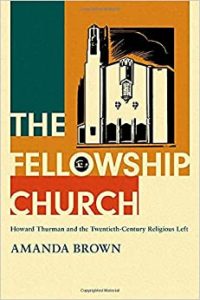
Amanda Brown, The Fellowship Church: Howard Thurman and the Twentieth-Century Religious Left. 2021
The Fellowship Church explores the evolution of the American religious left through a case study of the African American intellectual and theologian Howard Thurman, and the physical embodiment of his thought: The Church for the Fellowship of All Peoples. The Fellowship Church, which Thurman co-founded in San Francisco in 1944, was the nation's first interracial, intercultural, and interfaith church. Amidst the growing nationalism of the World War II era and the heightened suspicion of racial and cultural "others," the Fellowship Church successfully established a pluralistic community based on the idea that "if people can come together in worship, over time would emerge a unity that would be stronger than socially imposed barriers." Rooted in the belief that social change was inextricably connected to internal, psychological transformation and the personal realization of the human community, it was an early expression of Christian nonviolent activism within the long Civil Rights Movement.
The Fellowship Church was a product of evolving twentieth-century ideas and a reflection of the shifting mid-century American public consciousness. This book examines a broad scope of modern themes including the philosophy of pragmatism; mysticism and Christian liberalism; racism and imperialism; cosmopolitanism and pluralism; war and pacifism; and nonviolence. Not only does it expand on our understanding of twentieth-century American intellectual history and the origins of the Civil Rights Movement, it offers an exciting look into ways people have initiated grassroots activism during times when government has failed to protect its citizens' civil liberties, safety, and overall wellbeing through judicial safeguards.
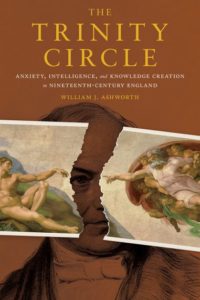
William J. Ashworth, The Trinity Circle: Anxiety, Intelligence, and Knowledge Creation in Nineteenth-Century England. 2021
University of Pittsburgh Press
The Trinity Circle explores the creation of knowledge in nineteenth-century England, when any notion of a recognizably modern science was still nearly a century off, religion still infused all ways of elite knowing, and even those who denied its relevance had to work extremely hard to do so. The rise of capitalism during this period—embodied by secular faith, political radicalism, science, commerce, and industry—was, according to Anglican critics, undermining this spiritual world and challenging it with a superficial material one: a human-centric rationalist society hell-bent on measurable betterment via profit, consumption, and a prevalent notion of progress. Here, William J. Ashworth places the politics of science within a far more contested context. By focusing on the Trinity College circle, spearheaded from Cambridge by the polymath William Whewell, he details an ongoing struggle between the Established Church and a quest for change to the prevailing social hierarchy. His study presents a far from unified view of science and religion at a time when new ways of thinking threatened to divide England and even the Trinity College itself.
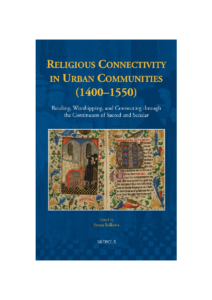
Susan Folkerts, ed. Religious Connectivity in Urban Communities (1400-1550): Reading, Worshipping, and Connecting through the Continuum of Sacred and Secular. 2021
The boundaries between sacred and secular in the late Middle Ages, traditionally perceived as separate domains, are nowadays perceived as porous or non-existent. This collection on religious connectivity explores a new approach to religious culture in the late Middle Ages. In assessing the porosity of the domains of sacred and secular, and of religious and lay, the contributors to this collection investigate processes of transfer of religious knowledge, literature, and artefacts, and the people involved.
Religious connectivity describes people in networks. This concept emphasizes dynamics and processes rather than stability, and focuses on all persons involved in transfer and appropriation, not just the producers. It is therefore a fruitful concept by which to explore medieval society and the continuum of sacred and secular. By using the lens of religious connectivity, the authors of this collection shed new light on religious activities and religious culture in late medieval urban communities.
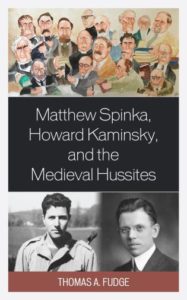
Thomas A. Fudge, Matthew Spinka, Howard Kaminsky, and the Medieval Hussites. 2021
The Hussite movement is essential for understanding medieval Europe and the development of Western civilization. Matthew Spinka and Howard Kaminsky stand at the forefront of scholarship introducing this subject to the Anglophone world. Thomas A. Fudge argues their role in the religious historiography of late medieval Europe is a precursor to global medievalism. Combining commitment to the Christian faith with firm opposition to the Soviet-mandated Marxist-Communist ideology that dominated twentieth-century Czechoslovakia, Spinka strove to present Jan Hus as a medieval figure driven by religious devotion. Motivated by Jewish atheism and a modified form of Marxist analysis, Kaminsky rescued the medieval Hussites from oblivion and political agendas. Fudge explores biography, history, and historiography as an essential intellectual segue between medieval Hussites and modern scholarship. Matthew Spinka, Howard Kaminsky, and the Medieval Hussites considers biography, evaluates the work of both historians, elaborates their methods, assesses their interpretations, and analyzes their historiographical significance for the study of Hussite history.
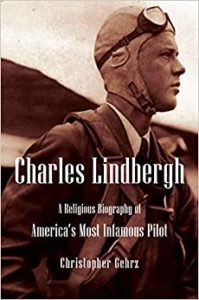
Christopher Gehrz, Charles Lindbergh: A Religious Biography of America’s Most Infamous Pilot. 2021
The narrative surrounding Charles Lindbergh’s life has been as varying and complex as the man himself. Once best known as an aviator—the first to complete a solo nonstop transatlantic flight—he has since become increasingly identified with his sympathies for white supremacy, eugenics, and the Nazi regime in Germany. Underexplored amid all this is Lindbergh’s spiritual life. What beliefs drove the contradictory impulses of this twentieth-century icon?
An apostle of technological progress who encountered God in the wildernesses he sought to protect, an anti-Semitic opponent of US intervention in World War II who had a Jewish scripture inscribed on his gravestone, and a critic of Christianity who admired Christ, Lindbergh defies conventional categories. But spirituality undoubtedly mattered to him a great deal. Influenced by his wife, Anne Morrow Lindbergh—a self-described “lapsed Presbyterian” who longed to live “in grace”—and friends like Alexis Carrel (a Nobel Prize–winning surgeon, eugenicist, and Catholic mystic) and Jim Newton (an evangelical businessman), he spent much of his adult life reflecting on mortality, divinity, and metaphysics. In this short biography, Christopher Gehrz represents Lindbergh as he was, neither an adherent nor an atheist, a historical case study of an increasingly familiar contemporary phenomenon: the “spiritual but not religious.”
For all his earnest curiosity, Lindbergh remained unwilling throughout his life to submit to any spiritual authority beyond himself and ultimately rejected the ordering influence of church, tradition, scripture, or creed. In the end, the man who flew solo across the Atlantic insisted on charting his own spiritual path, drawing on multiple sources in such a way that satisfied his spiritual hunger but left some of his cruelest convictions unchallenged.
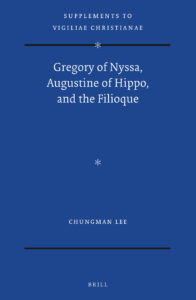
Chungman Lee. Gregory of Nyssa, Augustine of Hippo, and the Filioque. 2021
In this volume, Chungman Lee offers a concise yet thorough evaluation of the contemporary discussion on the filioque and the remaining issues still at stake. Lee examines the trinitarian theologies of Gregory of Nyssa and Augustine of Hippo, as representative of, respectively, the eastern and western patristic traditions. He demonstrates that they share similar ideas on the monarchy of the Father and on the role of the Son in the procession of the Holy Spirit, notwithstanding their slightly different expressions and perspectives. As such, the present study seeks to work towards a common patristic foundation for reconciliation between East and West on the problem of the filioque.
Finally, for staying up-to-date on the latest titles in all fields, we recommend regularly perusing New Books Network and its "New Books in Christian Studies” page. These pages are updated regularly.
